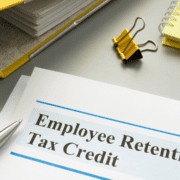The IRS Sends 20,000 ERC Disallowance Letters
Cracking Down on Compliance
On December 6, 2023, the IRS announced they were sending 20,000 letters to taxpayers, notifying them of disallowed ERC claims. The Employee Retention Credit is a refundable credit meant to reward businesses for continuing to pay employees through periods of government shutdowns or significantly reduced revenues due to the COVID-19 pandemic. However, it is no secret about the ERC mills that have been popping up all over the country, trying to convince ineligible employers to file claims for the credit through aggressive marketing tactics. This round of letters, combined with the moratorium on processing new ERC claims, is part of the IRS’s effort to complete more enhanced compliance reviews on existing claims.
Who Are The Disallowance Letters Targeting?
The issuance of the copies of Letter 105 C, titled “Claim Disallowed”, was just the first wave of letters by the IRS against ineligible ERC claims. This round of letters was focused mainly on two forms of ineligibility:
- The entity did not exist during the period of eligibility
- There were no paid employees during the period of eligibility
The disallowance letters are meant to serve multiple purposes. These letters help ineligible taxpayers avoid audits, repayment, penalties and interest. They also protect taxpayers by preventing an incorrect refund from going to an ERC promoter. Finally, these letters save the IRS resources by disallowing incorrect credits before the audit process begins.
Of course, it’s important to note that if the taxpayer disagrees with the disallowance, they can respond with supporting documentation of the eligibility for the credit or file an administrative appeal. Planning is currently underway for additional waves of letters, and the IRS is also finalizing its plan for a special voluntary disclosure program.
Withdrawal Program
|The IRS launched a withdrawal program in response to the ineligible claims filed by employers that were persuaded by the ERC mills and promoters. Taxpayers were allowed to withdraw their claims for the credit without punishment if they had not yet received the funds. Additionally, if a taxpayer received a check for their claimed credit but had not yet cashed it, they were still allowed to submit their withdrawal of the claim without punishment. The IRS is urging taxpayers to exercise extreme caution when applying for the ERC due to the aggressive marketing tactics used by ERC mills and promoters and to talk to trusted tax professionals about their eligibility.
Do you have questions about ERC eligibility? Leone, McDonnell & Roberts can help. Schedule a call with one of our tax advisors today.









